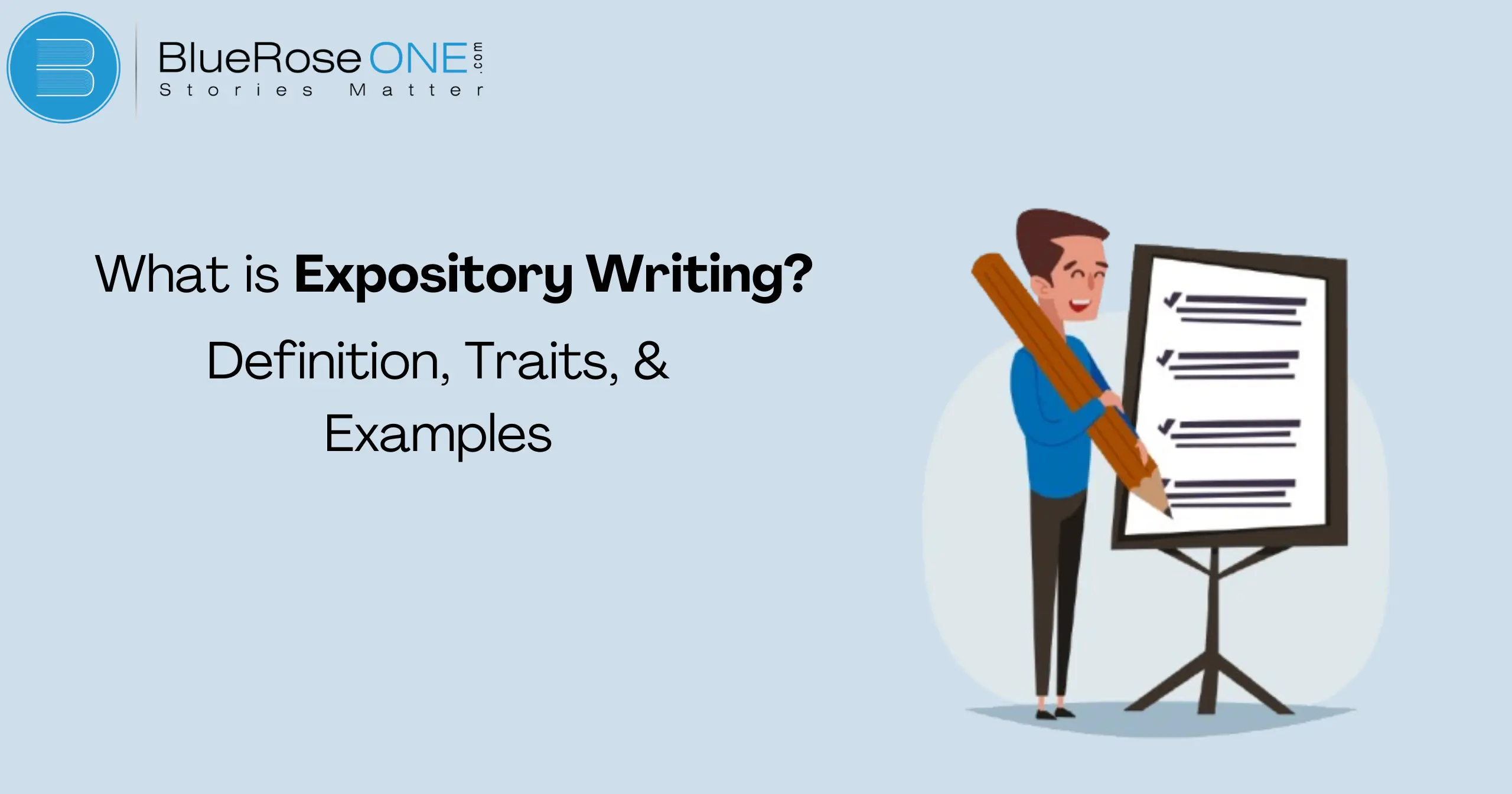One of the terms you hear thrown around in writing seminars is expository writing, but what does it really mean? Explaining, describing, or informing is the fundamental goal of expository writing.
In contrast to persuasive writing, which aims to persuade the reader of a specific point of view, expository writing is primarily concerned with objectively and clearly presenting facts and data.
Why then is it crucial to comprehend expository writing? Well, learning this style can greatly improve your capacity to convey information clearly, whether you’re writing an instruction manual, a news piece, or an essay for school.
You may also like: What is Cozy Mystery? A Beginner’s Complete Guide
What is Expository Writing?
Let’s dissect the word explanatory writing so that you may fully understand the concept. The term “expository” is derived from the verb “expose,” which means to make anything clear or obvious.
This translates into writing in a clear, logical manner by presenting the facts or providing an explanation of an idea. Expository writing’s main goal is to educate the reader by providing facts succinctly and clearly, without any superfluous detail or filler.
You may also like: How to Publish a Book? | Publish Your Book | BlueRoseOne
Key Characteristics of Expository Writing
Understanding the key characteristics of expository writing can help you recognize it and create it more effectively. Here are some essential traits:
Objective and Unbiased Tone
When writing an explanatory essay, objectivity and objectivity are crucial. The main goal of this writing style is to convey facts and information devoid of bias or sentiment.
Expository writing guarantees that the reader gets accurate and clear information while maintaining objectivity. Because it gives the audience the freedom to draw their own conclusions from the information provided,
this strategy fosters audience trust. One of the most important aspects of good explanatory writing is keeping an impartial and objective tone throughout.
You may also like: 5 Act Structure: Definition, Examples and More
Yoy may also like: Adjectives that starts with e | Words Popular in America
Structured Organization
Structured organization is crucial for effectively communicating ideas and information in expository writing. Writing of this kind usually proceeds in a logical order, with an introduction, body paragraphs supporting the key ideas with proof or explanations, and a conclusion summarizing the important ideas.
This methodical technique facilitates readers’ comprehension of the writer’s intent and the substance. Expository writing is more effective when it is structured to provide information in a clear, succinct, and organized way.
Use of Evidence and Examples
To properly explain and bolster the major ideas in an expository essay, examples and supporting data are essential. Writers can strengthen the persuasiveness and ease of understanding of their arguments by including facts, figures, and concrete examples.
This improves writing quality and aids in the clarification of difficult concepts. In order to establish credibility and persuade the reader, expository writing need strong evidence and pertinent examples.
You may also like: What is a Prologue? Tips and Techniques for Writers
Types of Expository Writing
There are several types of expository writing, each serving a unique purpose and format:
Descriptive Expository Writing
Expository writing that uses thorough details to paint a clear picture in the reader’s mind is known as descriptive expository writing. In order to provide the reader a deeper understanding of the subject,
it frequently contains sensory aspects like sight, sound, and touch. Descriptive expository writing, in contrast to narrative writing, concentrates on giving the reader comprehensive information about a certain topic or idea.
Process Expository Writing
Process expository writing describes the procedures involved in doing an action or the operation of an item. It gives readers concise, comprehensive instructions or a flowchart to assist them comprehend a procedure from beginning to end.
Expository writing of this kind is frequently seen in how-to articles, manuals, and guides. Because the objective is for the reader to be able to follow the stages with ease, this type of expository writing is useful while learning new tasks.
You may also read: 10 Magical Books That Combine Christmas and Fantasy
You may also like: 10 Best Fiction Books Set in America You Must Read
Comparison Expository Writing
Expository writing that draws comparisons and contrasts between two or more themes is known as comparison writing. By providing concise comparisons, this style of expository writing aids readers in understanding how things are similar or different.
A comparison essay might, for instance, examine the distinctions between two historical occurrences or the parallels between two distinct technological advancements.
Complex information is made easier to understand through contrast expository writing, which breaks down the subjects and presents the facts in an organized manner.
Cause and Effect Expository Writing
Expository writing on causes and effects describes how one event (the cause) results in another event (the consequence). By demonstrating how one thing effects another clearly, this kind of expository writing aids readers in understanding the connection between actions and results.
An essay might, for instance, examine the relationship between rising greenhouse gas emissions (cause) and global warming (effect). Complex interactions are made easier to understand by cause and effect expository writing, which logically arranges material and offers concise examples.
Problem and Solution Expository Writing
Issue and Resolution In expository writing, an issue is identified, and one or more remedies are suggested. This kind of explanatory writing lays out the problem clearly, investigates its root causes, and offers workable solutions.
It aids readers in comprehending the nature of the issue and how possible solutions might address it. This type of expository writing offers a fair assessment and practical guidance by emphasizing both the issue and possible solutions, which helps to make complicated subjects more approachable and understandable.
You may also read: Top 10 Ernest Hemingway Books Every Reader Should Explore
How to Write an Effective Expository Essay
Writing an effective expository essay requires careful planning and organization. Here are some steps to guide you:
Understanding the Prompt
Understanding the prompt is essential to producing an expository essay that is precise and well-focused. The prompt directs your study and writing by outlining the points you must make clear or investigate.
Sort the important ideas to cover and divide the prompt into manageable sections to produce an excellent explanatory essay. Knowing the prompt guarantees that you address all necessary details, resulting in an extensive and educational response that satisfies the reader’s needs.
You may also like: The Rise of Shakti by Megha Dinesh: Book Review
You may also read: 100+ Adjectives Begin with I (With Definitions & Examples)
Researching the Topic
Research is crucial while creating a successful explanatory essay. Begin by compiling data from dependable sources, including books, scholarly publications, and trustworthy websites.
Make thorough notes and arrange them according to the format of your essay. This will assist you in providing a precise and intelligible description of your subject.
Recall that the purpose of expository writing is to enlighten and instruct, so make sure your study is thorough and pertinent in order to present a balanced perspective.
Creating an Outline
An essential first step in expository writing is creating an outline. List and logically arrange your primary points first. A major component of your issue should be covered in each area of the outline, along with any supporting information and proof.
This methodical strategy guarantees that your essay flows naturally and aids in idea organization. Additionally, a well-defined plan streamlines the writing process and aids in keeping your core goal clearly explaining or informing your readers in focus.
You may also like: Fatal Flaw: Definition, Types, Example and More
Step-by-Step Guide to Expository Writing
Let’s dive into the structure of an expository essay and how to craft each section effectively:
Introduction Paragraph
Hook Statement
A hook statement is essential in expository writing because it draws the reader in and establishes the context for the information that follows. This first line or two should be interesting and pertinent, posing a thought-provoking query, fact, or story about the subject.
A strong hook piques readers’ interest and makes them want to know more. Strong hooks ensure a solid introduction to the explanation by guiding the reader toward the text’s primary ideas and arguments.
Background Information
The purpose of expository writing is to logically and clearly inform, explain, or describe a subject. It is a crucial kind of writing that is utilized in articles, reports, and essays.
Expository writing, as contrast to narrative or persuasive writing, concentrates on providing factual information devoid of the author’s viewpoint.
It has a clean opening, several in-depth body paragraphs, and a succinct conclusion. Gaining an understanding of expository writing facilitates the presentation of information in a way that readers can easily access and comprehend.
You may also read: Top 10 Types of Novels That Dominates Bestseller Lists
Thesis Statement
The central idea of expository writing is a thesis statement, which sums up your essay’s major points and arguments. It guides readers through your explanation by offering a succinct synopsis of the topics you will be covering in your writing.
Your thesis statement in an expository essay should be precise, concise, and supported by facts and evidence used throughout the text.
This key idea makes it easier for readers to follow and comprehend your explanation by keeping your writing coherent and on topic.
You may also like: What is a Preface? Key Characteristics with Examples
You may also read: Where the Red Fern Grows Book Summary & Themes
Body Paragraphs
Topic Sentences
A topic sentence in expository writing presents the primary concept of a body paragraph. This statement makes it apparent what will be covered in the paragraph, which aids readers in following along.
After that, the body paragraph elaborates on this concept using further facts, examples, or supporting data to help the reader understand the material.
Good expository writing makes sure that each paragraph provides concise, well-organized explanations while remaining focused on the main idea. This method keeps reader’s attention throughout the book and aids in their understanding of difficult information.
Supporting Details
Supporting facts are essential for effectively elucidating your core concept in expository writing. Each body paragraph contains supporting details, examples, and proof for the topic sentence you have chosen.
A strong topic phrase should come first in an expository essay, and you should then add supporting information to further develop your argument.
This arrangement makes your argument easier for readers to comprehend and follow. You should concentrate on a particular topical issue in each body paragraph to make your writing more coherent and understandable.
Transition Sentences
Transitional phrases are essential in expository writing because they help readers go from one body paragraph to the next with ease. By tying concepts together and guaranteeing coherence, they support the information’s continued flow.
For example, a transition sentence could introduce the following topic and provide a summary of the notion that was explained in the previous paragraph.
This method facilitates logical content organization and makes the argument easier for readers to understand. When transition phrases are used well, expository writing becomes more clear.
You may also read: Query Letter vs. Cover Letter: What’s the Difference?
Conclusion Paragraph
Restating the Thesis
In expository writing, restating the thesis in the conclusion paragraph is crucial for reinforcing the main point. This step involves summarizing the key arguments or findings of the essay to remind readers of the central idea.
By clearly restating the thesis, you ensure that your audience grasps the significance of your analysis or explanation. A strong conclusion not only restates the thesis but also ties together the supporting details, providing a clear and concise summary of the main points in expository writing.
Summarizing Key Points
Summarizing important points in expository writing entails restating the text’s primary concepts and illustrative details in a clear and concise manner.
This makes it easier for readers to understand the main points without becoming bogged down in minute details. Make sure your summary is clear and succinct by emphasizing the most crucial elements of the subject. You can improve the readability and accessibility of your expository writing by simplifying the essential ideas.
Closing Thought
The final paragraph or closing thought in an expository essay is vital for summarizing the main ideas covered. It should clearly summarize the facts and succinctly reaffirm the major points made in the text’s body.
This last section makes sure the reader leaves with a thorough comprehension of the subject and helps to answer any last queries. In expository writing, the conclusion strengthens the reader’s understanding of the topic by succinctly bringing the discussion to a close.
You may also read: The Hugo Award Voting Process: How Are Winners Selected?
The Role of Expository Writing in Education
Expository writing plays a crucial role in education, helping students develop essential skills:
Enhancing Critical Thinking
In order to improve critical thinking in the classroom, expository writing is essential. It assists students in dissecting material and developing a thorough understanding of it by emphasizing objective, concise explanations of difficult concepts.
Students are encouraged to examine material, come to logical conclusions, and express themselves clearly through this kind of writing.
Expository writing, through well-structured essays and reports, enhances critical thinking and problem-solving skills in addition to understanding.
Improving Research Skills
One of the most important aspects of developing research abilities is expository writing. It assists students in gaining the capacity to properly collect, arrange, and evaluate data by emphasizing the clear explanation and presentation of information.
Writing of this kind necessitates the logical presentation of facts and information, which improves research skills by stressing precision and thoroughness.
Expository writing is a crucial talent in education and beyond since it helps with understanding complicated subjects and develops critical thinking.
You may also like: 150+ Vivid Verbs to Supercharge Your Writing Every Writer Should Use
Encouraging Clarity of Thought
Expository writing promotes mental clarity, which is important in education. It facilitates the order and logical presentation of material by pupils, which enhances their comprehension of difficult ideas.
Through the utilization of facts and concise explanations, expository writing helps students interact with content in a methodical manner and successfully convey concepts.
This method is a vital tool in the teaching process since it not only encourages academic success but also develops critical thinking and problem-solving abilities.
You may also like: Quilbot Review: Can It Really Improve Your Writing in Literature?
Tips for Mastering Expository Writing
Becoming proficient in expository writing takes practice and attention to detail. Here are some tips to help you master this style:
Understand Your Audience
In order to write expository essays effectively, you must first understand your audience. Being aware of your intended audience might help you adapt your writing to their interests and degree of expertise.
When writing for beginners, for instance, provide concise explanations and easy-to-follow examples. You can go into intricate details and difficult subjects for a more knowledgeable audience.
You may make your expository writing interesting and educational by concentrating on the requirements and preferences of your readers. This will help make complex information easier to understand.
You may also like: How Can I Get a Book Published?
Keep It Simple and Direct
Writing explanatory essays requires clarity. Avoid using complicated sentences and stick to plain, direct language when writing. Make an effort to convey facts concisely, without using extraneous jargon or filler.
This strategy makes it easier for readers to comprehend your content and remember important details. Making simplicity a priority helps you write expository essays that are more effective by making your arguments and explanations clear and compelling.
Edit and Revise Thoroughly
Editing and reworking extensively is essential to mastering expository writing. After you’ve written your essay, give it a thorough reading.
Make sure your thoughts are coherent and well-explained, and strive for clarity. Verify your writing for any grammar or spelling mistakes that could divert attention from your major ideas.
Editing enhances the quality of your expository writing overall and helps you clarify your points of contention. This procedure makes sure that the information you provide is clear, interesting, and correct.
You may also read: A Touch of Eternity by Durjoy Dutta – Book Review
Conclusion
Expository writing is a fundamental skill that is essential for conveying information clearly and effectively. Whether you’re explaining a process, comparing two ideas, or describing a cause-and-effect relationship, mastering this style will help you communicate more effectively in both academic and everyday settings. Remember, the key to great expository writing is to stay objective, provide clear and concise information, and support your points with solid evidence.
You may also like: Top 10 Famous Khushwant Singh Books
Frequently Asked Questions
Expository writing aims to inform or explain, while persuasive writing seeks to convince the reader of a particular viewpoint. Expository writing is neutral and objective, whereas persuasive writing is subjective and often involves emotional appeals.
No, expository writing should avoid personal opinions. The focus is on presenting facts and information objectively to inform or explain, not to persuade or express personal beliefs.
To make expository writing more engaging, use interesting facts, anecdotes, or quotes to draw in the reader. Clear and vivid descriptions, along with well-chosen examples, can also help to make the content more relatable and engaging.
Common topics for expository essays include explaining a scientific concept, analyzing a piece of literature, comparing historical events, describing a process, or discussing the causes and effects of an event or situation.
Expository writing is important in academics because it helps students learn how to communicate information clearly and logically. It also enhances critical thinking, research skills, and the ability to organize and present complex ideas.















